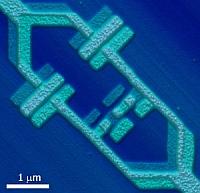Quantum Computer: Limit?
 Electron microscope image
Electron microscope imageof a qubit from Hans Mooij's
research group at Delft
University of Technology
Quantum computers have the potential to do certain calculations faster
than any foreseeable classical computers, but their success will depend
on preserving complex coherent quantum states. A quantum computer
makes use of the fact that a quantum mechanical system can
simultaneously exist in two states. Normally one of the two states
disappears as soon as the system comes into contact with the outside
world, and it is at this point that coherence is lost. A number of recent
discoveries have shown how to avoid that. For details on this topic, you
may read this article in Physics Today (June 1999; It's old but great)
-- Battling Decoherence: The Fault-Tolerant Quantum Computer
by Caltech Physics Professor, John Preskill.
Theoretical physicists, from the Foundation for Fundamental Research
on Matter (FOM) and Leiden University in the Netherlands, have,
claimed that quantum computers, which store information in so-called
quantum bits (or qubits), will be confronted with a fundamental limitation.
Dutch researchers Jasper van Wezel, Jeroen van den Brink and Jan
Zaanen made this claim in an article in Physical Review Letters, 17 June
2005. The claim is based on their discovery that the coherence of a qubit
-- a property essential to keeping the quantum information intact long
enough for it to be processed -- spontaneously disappears over the course
of time. The stored information vanishes along with that. They discovered
that coherence tends to disappear spontaneously, even without external
influences. The coherence in some highly promising concepts for qubits
may disappear after about a second. And the smaller the qubits, the faster
that process occurs.
This appears to pose a fundamental limitation on the development of
qubits and of working quantum computers. We still need to wait for some
experimental confirmation that can demonstrate that this phenomenon
actually occurs. For details, visit www.lorentz.leidenuniv.nl.


0 Comments:
Post a Comment
<< Home